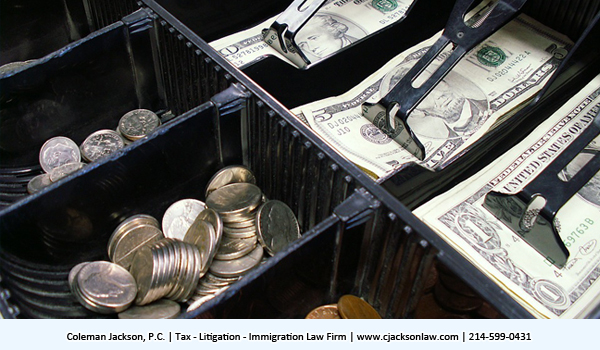Coleman Jackson, P.C. | Transcript of Legal Thoughts
Published December 26, 2022
Overview:
Legal Thoughts is an audiocast presentation by Coleman Jackson, P.C., a law firm based in Dallas, Texas serving individuals, businesses, and agencies from around the world in taxation, contract litigation, and immigration legal matters.
This episode of Legal Thoughts is an audiocast where the Attorney, Coleman Jackson is being interviewed by Alexis Brewer, Tax Legal Assistant of Coleman Jackson, P.C. The topic of discussion is “Starting Your First Business in Texas – State and Federal Tax Obligations and the Upcoming FinCEN BOI Reports.” You can listen to this podcast by clicking here:
If you enjoy this podcast, make sure to stay tuned for more episodes from the taxation, litigation, and immigration Law Firm of Coleman Jackson, P.C. Be sure to subscribe. Visit the taxation, litigation and immigration law firm of Coleman Jackson, P.C. online at www.cjacksonlaw.com.
TRANSCRIPT:
ATTORNEY: Coleman Jackson
LEGAL THOUGHTS
COLEMAN JACKSON, ATTORNEY & COUNSELOR AT LAW
ATTORNEY: Coleman Jackson
Welcome to Legal Thoughts
My name is Coleman Jackson and I am an attorney at Coleman Jackson, P.C., a taxation, contract litigation and immigration law firm based in Dallas, Texas.
In addition to myself, we have Alexis Brewer – Tax Legal Assistant, Leiliane Godeiro – Litigation Legal Assistant, and Johanna Powell – Tax Legal Assistant.
On today’s “Legal Thoughts” podcast, our Tax Legal Assistant, Alexis Brewer, will be interviewing me on the important topic of: Starting Your First Business in Texas. This is a series of podcasts, and today’s episode will focus on: “State and Federal Tax Obligations and the Upcoming FinCEN BOI Reports”
INTERVIEWER: Alexis Brewer, Tax Legal Assistant
Hi everyone, my name is Alexis Brewer and I am a Tax Legal Assistant at the tax, contract litigation and immigration law firm of Coleman Jackson, Professional Corporation. Our law firm is located at 6060 North Central Expressway, Suite 620, right here in Dallas, Texas.
Good afternoon, Attorney; thank you for agreeing to sit with me as I interview you with respect to this hot tax topic: “Starting Your First Business in Texas – State and Federal Tax Obligations and the Upcoming FinCEN BOI Reports.”
Let’s jump right in,
Question 1: Attorney could you give us a quick picture of the type of taxes imposed in state of Texas?
Attorney Answer – Question 1:
Hello Alexis.
First and foremost, everyone needs to understand that the State of Texas imposes a series of taxes on individuals and businesses, but there are no income taxes in Texas. Also, folks, individuals and businesses need to understand that property taxes are levied by local governments, such as, city, county, school districts and etc. throughout the State of Texas. The law of local property taxes is fairly straight forward and our law firm does not practice this area of law.
- So, let me name several of the significant taxes imposed on individuals and businesses. Texas imposed the following taxes, among others:
- Limited Sales, Use and Excise Taxes are imposed on individuals and businesses;
- Texas Franchise Taxes are imposed on certain types of businesses;
- Estate and Generation-Skipping Taxes are imposed on estates;
- Unemployment Compensation Taxes are imposed on employers in Texas with employees;
- Alcoholic Beverages Taxes are imposed on establishments with such licenses to sell or distribute alcoholic products;
- Insurance taxes;
- Hotel taxes are imposed on guess of hotels, motels and similar establishments;
- Motor fuel taxes
This is just a list of eight types of taxes imposed by the State of Texas which generates the most revenue for the state. There are a number of other types of taxes that Texas imposes on individuals and businesses operating within the State of Texas. Anyone wishing to discuss these taxes can contact us with any specifics or follow our Blogs at www.cjacksonlaw.com; or follow our Legal Thoughts Podcasts; or follow our Law Watch videos on our You-Tube Channel where we frequently discuss various topics dealing with taxation, contracts, litigation and immigration matters those folks ought to know about.
INTERVIEWER: Alexis Brewer, Tax Legal Assistant
That leads me right into my next question, Attorney –
Question 2: What is the number one type of tax imposed by the State of Texas that everyone in Texas needs to know about?
Attorney Answer – Question 2:
Well Alexis, property taxes that are imposed by local governments is clearly a tax everyone in Texas should be aware of since Texas is one of the highest property tax states in the nation. Property Taxes are taxes imposed by local governments throughout the State of Texas. All people residing in Texas need to know about the property tax system because this is how public schools are financed as well as public hospitals and health services and a number of other major local and municipal services.
Alexis with that said, the number one type of tax imposed by the state that everyone needs to be aware of is the Texas Limited Sales, Use and Excise tax which is applies to most purchases of goods and some services.
Remember, as I previously stated; Texas does not have a state income tax. So, our listeners should be asking themselves; so how does the State of Texas pay its bills? The Limited Sales, Use & Excise Tax is; by far, the biggest tax revenue generator for the State of Texas. The Limited Sales, Use, & Excise Tax generates about 58% of Texas’ tax revenues annually. This is the first major tax imposed by the State of Texas that everyone in Texas must be aware of. Anyone operating a business or thinking about starting a business in Texas must do their due diligence with respect to whether their products, goods and services are subject to the Limited Sales, Use, & Excise Tax. If their products and services are subject to this tax; the business-owner is a trustee for the State of Texas and must obtain a sales tax permit, collect the appropriate sales taxes from each transaction and report and submit the monies to Texas Comptroller of Public Accounts, who is the chief tax collector for the State of Texas. Business owners and other responsible parties can become personally liable for messing with Texas with respect to these sales, use and excise tax matters.
Texas imposes a 6.25% sales and use tax on sales, leases and rentals of touchable movable property (“tangible property”) and on certain specified services in Texas Tax Code Section 151. Localities are also allowed to impose up to a maximum of 2% sales and use tax with respect to transactions within their jurisdictions. The maximum limited sales, excise and use tax permitted in the Texas Tax Code is 8.25% of the gross taxable sales amount.
The sales and use tax are complimentary which means that Texas only gets to collect the tax as a sales tax paid by the purchaser at the time of the sale, or as a use tax paid by the merchant in the event the sales tax was not paid by the purchaser at the time of the sale. Bottom line, the tax should only be paid once either as a sales tax or as a use tax. Merchants in Texas are required under the Texas Tax Code to collect the tax as a trustee for the state of Texas. Since the United States Supreme Court’s Wayfair decision, a couple of years ago, out of state merchants selling customers in the state of Texas could be subject to the same Texas Tax Code obligations as brick and mortal merchants operating with facilities and agents physically within the state. The Texas Comptroller has issued guidance for out of state providers of taxable services and goods selling to customers inside Texas which can be found on the Comptroller’s website.
Any merchant inside the state or outside of the state who conducts a business subject to the Texas Limited Sales, Use and Excise Tax must obtain a sales tax permit from the Texas Comptroller of Public Accounts. Again, the Texas Comptroller of Public Accounts is the chief tax collector for the State of Texas who administers the Texas Tax Code. All kinds of useful and informative information can be found on the Comptroller’s website.
INTERVIEWER: Alexis Brewer, Tax Legal Assistant
Question 3: Attorney, is there any other major tax imposed by the State of Texas that impacts business owners in Texas?
Attorney Answer – Question 3:
Alexis, another major tax imposed in Texas is the Texas Franchise tax; which is also known as the Margin’s Tax. The Texas Franchise Tax is a tax imposed on some businesses for the privilege of doing business in Texas. Anyone interested in this topic can find this tax in the Texas Tax Code.
Several entities subject to the Texas Franchise Tax are:
- Corporations;
- Limited Liability Companies (LLC, including single member and/or husband and wife owned LLC);
- Banks;
- State limited banking associations;
- Savings and loan associations;
- S Corporations;
- Professional Corporations;
- Partnerships (general, limited and limited liability);
- Trusts;
- Professional Associations;
- Joint Ventures; and
- Other business entities not exempt by statute
Entities not subject to the Franchise tax are:
- Sole Proprietorships;
- General Partnerships (when ownership consist solely of natural persons or individuals. The partnership cannot have any legal entity owners);
- Certain grantor trusts , estates of natural persons and escrows;
- Exempt entities under Tax Code Section 171, Subchapter B;
- Various other unincorporated passive entities, real estate investment trusts and entities classified under Insurance Code Chapter 2212;
- Certain trust subject to Internal Revenue Code Section 401(a) or 501(c)(9).
Alexis, the actual computation of the Texas Franchise Tax can be an extremely complicated accounting computation; and any business subject to this tax should hire a very competent Certified Public Accountant who works with business owners who must regularly pay franchise taxes. Many businesses; perhaps most Texas businesses, who are subject to the Texas Franchise Tax only have to file a no-tax due report each year. Franchise tax reports are filed annually online with the Texas Comptroller of Public Accounts and there are penalties for failure to file and/or failure to timely pay any franchise taxes that are due for the period.
INTERVIEWER: Alexis Brewer, Tax Legal Assistant
Attorney, so far, we’ve been discussing some of the taxes imposed by local governments, property tax in particular imposed locally, and some of the important taxes imposed by the State of Texas in this podcast – for example, the sales, use and excise tax and franchise tax. There are some upcoming changes on the federal law horizon that you mentioned to me a few of days ago, and I thinking we should wrap up this podcast by explaining that.
Question 4: Attorney, can you briefly explain the Corporate Transparency Act and its key provisions?
Attorney Answer – Question 4:
This is a great question and it’s a very important one!
This past year, Congress passed the Corporate Transparency Act (CTA) as a part of the Anti-Money Laundering Act of 2020 (AMLA). The stated goal of the AMLA was to aid the federal government in detecting and preventing money laundering, tax fraud and other illicit activities.
The Corporate Transparency Act, as a result, imposes new mandatory reporting obligations with the stated intention of catching and stopping this illicit behavior. The FinCEN reports created under this mandatory rule are called, “Beneficial Ownership Information Reports” or BOI reports. The Corporate Transparency Act will require most corporations, limited liability companies, and other entities created in or registered to do business in the United States to report information about their beneficial owners—the persons who ultimately own or control the company, to the U.S. Treasury’s Financial Crimes Enforcement Network (FinCEN).
The Corporate Transparency Act and its new reporting requirements is a huge change coming for all businesses structured under any state or tribal entity organization structuring laws and impose significant new disclosure obligations on business organizers and business owners of entities structured under state and tribal business organizational laws. The Financial Crimes Network (FinCEN) is the U.S. Department of Treasury agency authorized to enforce the Corporate Transparency Act.
The final rules implementing the Corporate Transparency Act was published by the Financial Crimes Network (FinCEN) on September 30, 2022 in the Federal Register, and applies to domestic & foreign “reporting companies of all sizes, including the smallest of companies.”
A reporting company is a corporation, limited liability company, or any other entity created by filing entity structuring instruments with a secretary of state or any similar office under the law of a state.
- For example, in Texas, the term “reporting companies” would include most business entities structured under the Business Organization Code, with the exception of sole proprietorships and general partnerships. If the business filed organizational documents with the Texas Secretary of State, the final FinCEN rules implementing the Corporate Transparency Act applies to them.
A “beneficial owner” under the FinCEN final rule includes any individual who, directly or indirectly:
- exercises substantial control over a reporting company, or
- owns or controls at least 25 percent of the ownership interests in a reporting company.
INTERVIEWER: Alexis Brewer, Tax Legal Assistant
Attorney, these sound like huge changes for business owners! Do you mean to say that the rules apply to even a mom-and-pop business that operates as an LLC!
Question 5: What kind of information will this mom-and-pop organization and other businesses structured under state law have to file and where will they have to file it?
Attorney Answer – Question 5:
Yes, Alexis, that is exactly what I am saying. The final FinCEN rules do not exempt small business from the obligations imposed on affected business organizations. The rules apply to the mom-and-pop limited liability company as well as other businesses structured under state and tribal laws. They all meet the definition of ‘reporting company’ and must comply with the reporting rules.
When a reporting company files a “Beneficial Ownership Information Report,” or BOI report, with the Financial Crimes Network (FinCEN), they are required to identify themselves and report four types of information about each of its beneficial owners:
- Name
- Birthdate
- Address, and
- A unique identifying number issued by a jurisdiction in an acceptable document. A copy of this acceptable identifying document must be sent to FinCEN for inspection. The document must be valid and current.
The FinCEN final rules implementing the Corporate Transparency Act and the related new reporting obligations are effective on January 1, 2024.
- Reporting companies created or registered before January 1, 2024 will have one year (until January 1, 2025) to file their initial BOI reports
- Reporting companies created or registered after January 1, 2024, will have 30 days after receiving notice of their creation or registration to file their initial BOI reports.
Alexis, our law firm will continue to monitor developments with respect to the Corporate Transparency Act and FinCEN announcements implementing the BOI rules. Our office has been filing FBAR reports with the Financial Crimes Network on behalf of taxpayers for years now; and FinCEN is where the new BOI reports will be filed as well. Any of our listeners should follow our blogs and Legal Thoughts Podcasts where we discuss these types of topics.
Interviewer Wrap-Up
Attorney, thank you for siting with me today to explain the tax obligations of starting a new business in Texas. Today the key take aways from this podcast discussion are:
- Texas sales & use tax in Texas: This is a major tax imposed by the State of Texas impacting everyone who buys or sales goods and certain services,
- Texas Franchise tax: This too is a major tax imposed by the State of Texas on certain business structured under the Texas Business Organization Code and filed with the Texas Secretary of State, and potentially the big federal rule. Attorney even impacting
- Corporate Transparency Act: This is a new, big federal rule coming up in 2024. The new mandatory rule issued by the Financial Crimes Network (FinCEN) requires businesses structured under state or tribal entity organizational laws to file “Beneficial Ownership Information Reports” with the Financial Crimes Network. This rule is wide-reaching and will even impact the small mom-and-pop LLCs. Our office needs to watch the BOI report developments and perhaps produce future blogs, videocast and Legal Thoughts podcasts on this topic.
To our listeners who want to hear more podcast like this one please subscribe to our Legal Thoughts Podcast on Apple Podcast, Google Podcast, Spotify or where ever you listen to your podcast. Take care, everyone! And come back in about two weeks, for more taxation, litigation and immigration Legal Thoughts from Coleman Jackson, P.C., located right here in Dallas, Texas at 6060 North Central Expressway, Suite 620, Dallas, Texas 75206.
English callers: 214-599-0431 | Spanish callers: 214-599-0432 |Portuguese callers: 214-272-3100
Attorney Closing Remarks
This is the end of today’s Legal Thoughts!
Thank you all for giving us the opportunity to inform you about: “Starting Your First Business in Texas – State and Federal Tax Obligations and the Upcoming FinCEN BOI Reports”
If you want to see or hear more taxation, litigation and immigration LEGAL THOUGHTS from Coleman Jackson, P.C. Subscribe to our Legal Thoughts Podcast on Apple Podcast, Google Podcast, Spotify or wherever you listen to your podcast.
Stay tuned! We are here in Dallas, Texas and want to inform, educate and encourage our communities on topics dealing with taxation, litigation and immigration. Until next time, take care.












